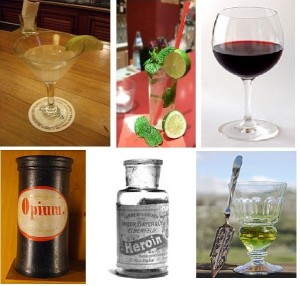If you consume alcohol or mind-altering drugs, will that improve your writing? Many people think so. Supposing it’s true, it’s nice to have that short-cut to greatness available, isn’t it? Why struggle to choose the right words while sober or clean when you can snort, inject, or imbibe your way to literary greatness?
 The connection persists because so many of the top writers, it seems, had a reputation for using drugs or alcohol. The two that spring to my mind are Edgar Allan Poe’s use of opium and absinthe, and Ernest Hemingway’s consumption of wine, mojitos, and daiquiris. The list of famous authors who wrote under the influence also includes Anthony Burgess, William S. Burroughs, Raymond Chandler, Jean Cocteau, Phillip K. Dick, William Faulkner, F. Scott Fitzgerald, Aldous Huxley, Jack Kerouac, Ken Kesey, Stephen King, Carson McCullers, Dorothy Parker, Robert Louis Stevenson, Oscar Wilde, and Tennessee Williams.
The connection persists because so many of the top writers, it seems, had a reputation for using drugs or alcohol. The two that spring to my mind are Edgar Allan Poe’s use of opium and absinthe, and Ernest Hemingway’s consumption of wine, mojitos, and daiquiris. The list of famous authors who wrote under the influence also includes Anthony Burgess, William S. Burroughs, Raymond Chandler, Jean Cocteau, Phillip K. Dick, William Faulkner, F. Scott Fitzgerald, Aldous Huxley, Jack Kerouac, Ken Kesey, Stephen King, Carson McCullers, Dorothy Parker, Robert Louis Stevenson, Oscar Wilde, and Tennessee Williams.
The effects of alcohol that might benefit a writer include a loss of inhibitions, which might stimulate creativity. However, other effects would be less helpful: blurred vision, slurred speech, slowed reaction times, impaired memory, blackouts, shaking, lack of muscle coordination and balance.
Drugs vary in their effects, but some of the reactions that might aid an author include euphoric pleasure, confidence, and extended wakefulness. I suppose hallucinations could be of use to a writer, so let’s include those. However, the known downsides of drugs can include delusions, aggression, paranoia, drowsiness, respiratory depression, nausea, blurred vision, headaches, disorientation, impaired memory, slowed reaction time, diminished judgment, mood swings, and addiction.
On balance, it seems to me there would be more harm than good in drinking or using drugs to improve your writing. Some of the things said about the writers I listed above may not even be true. The Edgar Allan Poe Society has debunked the myths about the writer of “Annabel Lee” and “The Bells.” It’s not entirely clear if some of the other writers took drugs or alcohol to improve their writing or to cope with their troubled lives.
I remain skeptical about using drugs or alcohol as a path to quality writing. Joanna Penn, whose blog I follow, has written a very thoughtful piece on the subject. I have to commend author Eric Kuentz for actually conducting an experiment and being willing to share his experience. His results seem rather mixed and it appears he’s disinclined to recommend the practice to others.
I’d like to hear your thoughts on, or experiences with, this subject. Please leave a comment. As for my own experiences, well, my scribing job occasionally takes me to Olympus where I’m sometimes allowed to partake of ambrosia and nectar. Those are the substances most recommended by—
Poseidon’s Scribe

Hi Steve!
The Journal of Consciousness and Cognition published some study findings in February 2012 where they proved that drinking vodka allows you to be more creative. (The study was called, “Uncorking the Muse.” Love that.) The ‘experimenters’ based their findings on the ability to think of certain word combinations rather than on writing (So subjective!) but it was an interesting study nonetheless.
I wrote about it here: http://kellyaharmon.com/martinis-drinking-vodka-good-creativity/, and link to the full story.
Hey, Kelly! I enjoyed your blog entry. As one of your commenters said, more research is indicated!